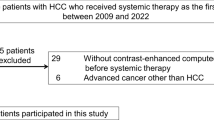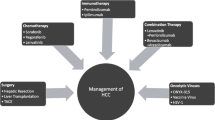Abstract
Background
The survival benefit of postoperative adjuvant transcatheter arterial chemoembolization (TACE) remains controversial.
Aims
We aim to investigate the survival effect of postoperative adjuvant TACE on the prognosis of hepatitis B virus (HBV)-related hepatocellular carcinoma (HCC) patients (stage B, the Barcelona Clinic Liver Cancer staging).
Methods
Sixty consecutive HBV-related HCC patients (stage B) from February 2006 to May 2009 undergoing surgical resection were included in this study. Of these 60 patients, 34 patients underwent surgery only (Group A) and 26 patients underwent surgery plus TACE (Group B). We followed-up until May 2013. Overall survival rates as well as prognostic factors were analyzed by the Kaplan–Meier method, the log-rank test or Cox’s proportional hazard model. All patients’ data were collected from the hospital medical records, which were described precisely after accurate clinical samples detection.
Results
The 1-, 2-, and 3-year overall survival rates in surgery-only group were 58.8, 32.4 and 12.6 %, and the rates in surgery plus TACE group were 73.1, 61.5, and 48.9 %, respectively (P = 0.033). The median survival time of the two groups after surgery and surgery plus TACE was 15.0 months [95 % confidence interval (CI) 10.714–19.286] and 35.0 months (95 % CI 20.974–49.026). In multivariate analysis, hemoglobin, HBeAg, peripheral blood regulatory T cells and tumor size were independent prognostic elements for HBV-related HCC patients (stage B).
Conclusions
Postoperative adjuvant TACE improves the survival of patients with HBV-related HCC (stage B) after curative resection compared to surgery only.

Similar content being viewed by others
References
Rilling WS, Drooz A (2002) Multidisciplinary management of hepatocellular carcinoma. J Vasc Interv Radiol 13:S259–S263
Lencioni R, Chen XP, Dagher L et al (2010) Treatment of intermediate/advanced hepatocellular carcinoma in the clinic: how can outcomes be improved? Oncologist 15:42–52
Parkin DM (2006) The global health burden of infection-associated cancers in the year 2002. Int J Cancer 118:3030–3044
Lai MY, Chen DS, Chen PJ et al (1998) Status of hepatitis B virus DNA in hepatocellular carcinoma: a study based on paired tumor and nontumor liver tissues. J Med Virol 25:249–258
Kim BK, Park JY, Kim do Y et al (2008) Persistent hepatitis B viral replication affects recurrence of hepatocellular carcinoma after curative resection. Liver Int 28:393–401
Chuma M, Hige S, Kamiyama T et al (2009) The influence of hepatitis B DNA level and antiviral therapy on recurrence after initial curative treatment in patients with hepatocellular carcinoma. J Gastroenterol 44:991–999
Yang T, Lu JH, Zhai J et al (2012) High viral load is associated with poor overall and recurrence-free survival of hepatitis B virus-related hepatocellular carcinoma after curative resection: a prospective cohort study. Eur J Surg Oncol 38:683–691
Kubo S, Hirohashi K, Tanaka H et al (2001) Virologic and biochemical changes and prognosis after liver resection for hepatitis B virus-related hepatocellular carcinoma. Dig Surg 18:26–33
Ohkubo K, Kato Y, Ichikawa T et al (2002) Viral load is a significant prognostic factor for hepatitis B virus-associated hepatocellular carcinoma. Cancer 94:2663–2668
Bruix J, Llovet JM (2002) Prognostic prediction and treatment strategy in hepatocellular carcinoma. Hepatology 35:519–524
El-Serag HB, Marrero JA, Rudolph L et al (2008) Diagnosis and treatment of hepatocellular carcinoma. Gastroenterology 134:1752–1763
Hanazaki K, Kajikawa S, Shimozawa N et al (2002) Hepatic resection for hepatocellular carcinoma in diameter of ≥10 cm. Hepatogastroenterology 49:518–523
Ng KK, Vauthey JN, Pawlik TM et al (2005) Is hepatic resection for large or multinodular hepatocellular carcinoma justified? Results from a multi-institutional database. Ann Surg Oncol 12:364–373
Lin CT, Hsu KF, Chen TW et al (2010) Comparing hepatic resection and transarterial chemoembolization for barcelona clinic liver cancer (BCLC) Stage B hepatocellular carcinoma: change for treatment of choice? World J Surg 34:2155–2161
Tsai TJ, Chau GY, Lui WY et al (2000) Clinical significance of microscopic tumor venous invasion in patients with resectable hepatocellular carcinoma. Surgery 127:603–608
Zhu AX (2006) Systemic therapy of advanced hepatocellular carcinoma: how hopeful should we be? Oncologist 11:790–800
Yeo W, Mok TS, Zee B et al (2005) A randomized phase III study of Doxorubicin versus cisplatin/interferon alpha-2b/Doxorubicin/fluorouracil (PIAF) combination chemotherapy for unresectable hepatocellular carcinoma. J Natl Cancer Inst 97:1532–1538
Leung TW, Patt YZ, Lau WY et al (1999) Complete pathological remission is possible with systemic combination chemotherapy for inoperable hepatocellular carcinoma. Clin Cancer Res 5:1676–1681
Iwamiya T, Sawada S, Ohta Y (1994) Repeated arterial infusion chemotherapy for inoperable hepatocellular carcinoma using an implantable drug delivery system. Cancer Chemother Pharmacol 33:S134–S138
Okada S (1998) Transcatheter arterial embolization for advanced hepatocellular carcinoma: the controversy continues. Hepatology 27:1743–1744
Mathurin P, Raynard B, Dharancy S et al (2003) Meta-analysis: evaluation of adjuvant therapy after curative liver resection for hepatocellular carcinoma. Aliment Pharmacol Ther 17:1247–1261
Tanaka K, Shimada H, Togo S et al (1999) Use of transcatheter arterial infusion of anti-cancer agents with lipiodol to prevent recurrence of hepatocellular carcinoma after hepatic resection. Hepatogastroenterology 46:1083–1088
Fukuda S, Okuda K, Imamura M et al (2002) Surgical resection combined with chemotherapy for advanced hepatocellular carcinoma with tumor thrombus: report of 19 cases. Surgery 131:300–310
Xi T, Lai EC, Min AR et al (2012) Adjuvant transarterial chemoembolization after curative resection of hepatocellular carcinoma: a non-randomized comparative study. Hepatogastroenterology 59:1198–1203
Pringle JH (1908) Notes on the arrest of hepatic hemorrhage due to trauma. Ann Surg 48:541–549
Liao KF, Lai SW, Lin CY et al (2011) Risk factors of recurrence after curative resection of hepatocellular carcinoma in Taiwan. Am J Med Sci 341:301–304
Chang SKY, Hlaing WW, Yu RQ et al (2012) Value of alpha-foetoprotein for screening of recurrence in hepatocellular carcinoma post resection. Singap Med J 53:32–35
Lai CL, Ratziu V, Yuen MF et al (2003) Viral hepatitis B. Lancet 362:2089–2094
Chen CH, Huang GT, Yang PM et al (2006) Hepatitis B- and C-related hepatocellular carcinomas yield different clinical features and prognosis. Eur J Cancer 42:2524–2529
Shijo H, Okazaki M, Koganemaru F et al (1991) Influence of hepatitis B virus infection and age on mode of growth of hepatocellular carcinoma. Cancer 67:2626–2632
Lai EC, Lo CM, Fan ST et al (1998) Postoperative adjuvant chemotherapy after curative resection of hepatocellular carcinoma: a randomized controlled trial. Arch Surg 133:183–188
Chen L, Zhang Q, Chang W et al (2012) Viral and host inflammation-related factors that can predict the prognosis of hepatocellular carcinoma. Eur J Cancer 48:1977–1987
Chen JD, Yang HI, Iloeje UH et al (2010) Carriers of inactive hepatitis B virus are still at risk for hepatocellular carcinoma and liver-related death. Gastroenterology 138:1747–1754
Ren ZG, Lin ZY, Xia JL et al (2004) Postoperative adjuvant arterial chemoembolization improves survival of hepatocellular carcinoma patients with risk factors for residual tumor: a retrospective control study. World J Gastroenterol 10:2791–2794
Zhong C, Guo RP, Li JQ et al (2009) A randomized controlled trial of hepatectomy with adjuvant transcatheter arterial chemoembolization versus hepatectomy alone for Stage III a hepatocellular carcinoma. J Cancer Res Clin Oncol 135:1437–1445
Zhou G, Drake CG, Levitsky HI (2006) Amplification of tumor-specific regulatory T cells following therapeutic cancer vaccines. Blood 107:628–636
Acknowledgments
This work was supported in part by the National Natural Science Foundation of China (No. 81001002, 30973438, 81101754 and 81201861), Tianjin Natural Science Foundation (No. 09JCYBJC10400) and Tianjin Health Bureau Foundation (No. 2010KZ7).
Conflict of interest
We declare that we have no conflict of interest.
Ethical statement
We declare that all study participants provided informed consent, and the study design was approved by the Tianjin Anti-Cancer Association and Tianjin Medical University Cancer Hospital and Institution Ethics Committee and have been performed in accordance with the ethical standards laid down in the 1975 Declaration of Helsinki.
Author information
Authors and Affiliations
Corresponding author
Rights and permissions
About this article
Cite this article
Li, F., Guo, Z., Zhang, Y. et al. Postoperative adjuvant arterial chemoembolization improves the survival of hepatitis B virus-related hepatocellular carcinoma: a retrospective control study. Ir J Med Sci 184, 753–759 (2015). https://doi.org/10.1007/s11845-014-1164-6
Received:
Accepted:
Published:
Issue Date:
DOI: https://doi.org/10.1007/s11845-014-1164-6




